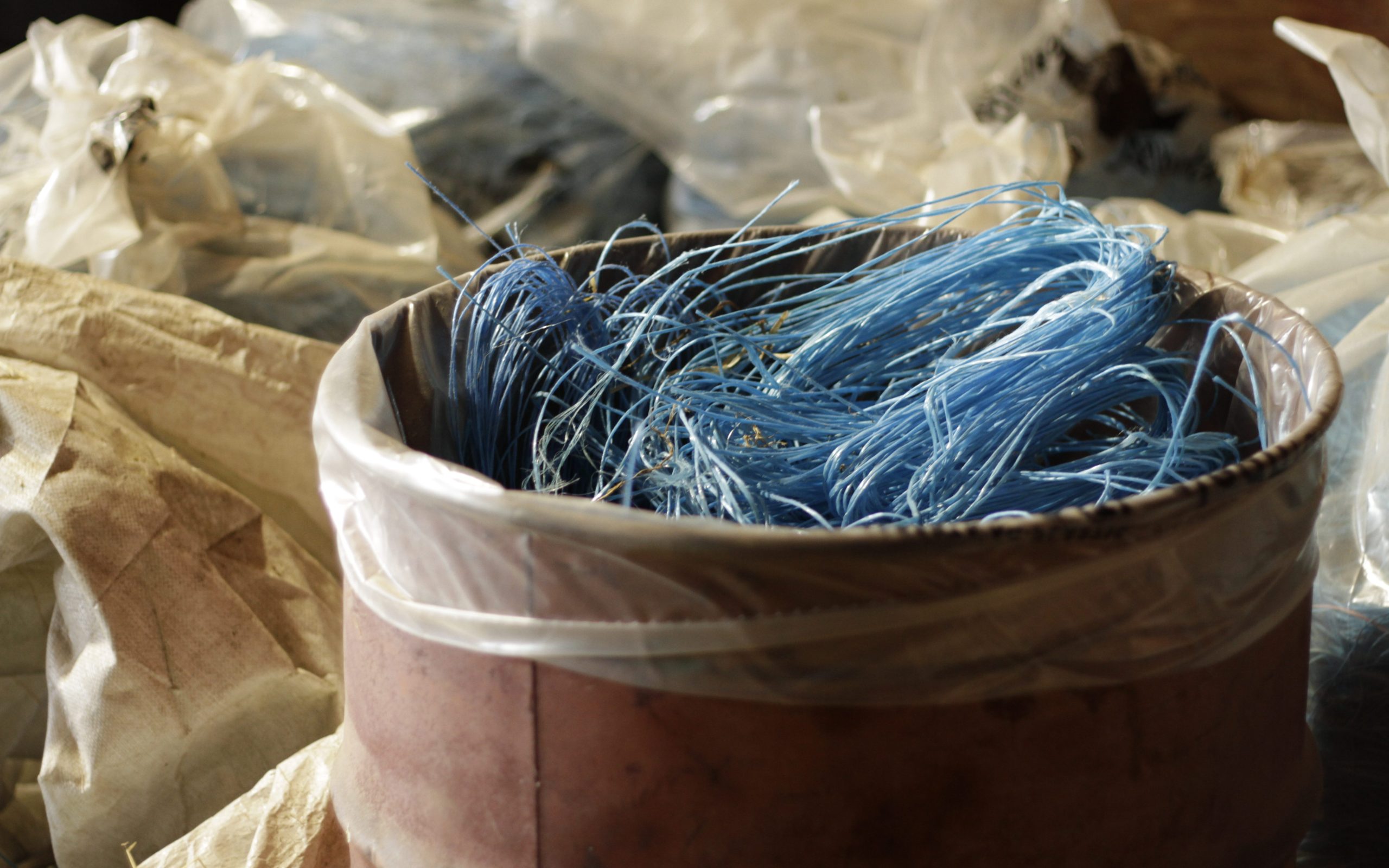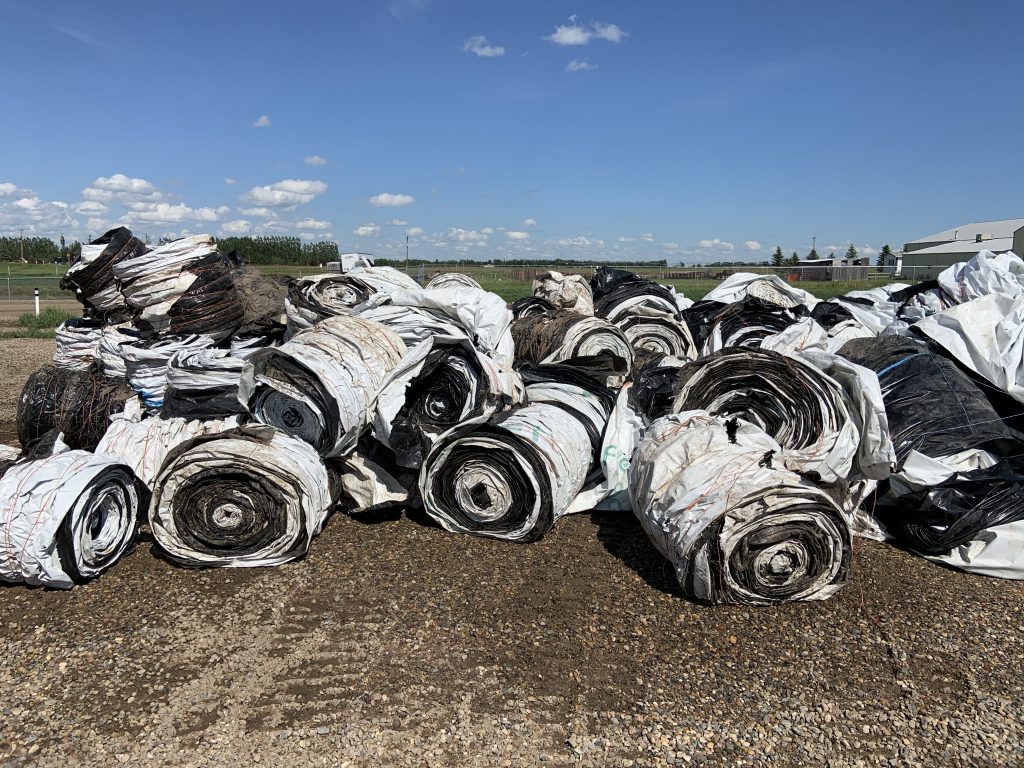AB Direct - Steers
Rail: ---
AB Direct - Heifers
Rail: ---
US Trade- Steers
Rail: 290.00 (IA)
US Trade - Heifers
Rail: 290.00 (IA)
Canadian Dollar
0.02

Alberta farmers getting on board with grain bag recycling pilot
Farmers universally value tools that give them options when it comes to making decisions about crop production. For example, some prairie farmers choose to use grain bags if a harvest has been abundant and extra storage is needed or bin storage is not available close to where the grain is harvested.
In the past decade, travellers on the prairies have become accustomed to seeing the long, cylindrical, white plastic sleeves laid out on farmland in the fall and winter. Made of durable layers of low-density polyethylene, the white exterior and black interior layers preserve the contents until the farmer decides to move the grain.
While plastic grain bags offer a useful option for storing grain, managing the used plastic when the grain bag is no longer needed can be challenging. Alberta farmers generate nearly 2,000 tonnes of used plastic from grain bags annually. Until the past few years, users of grain bags either took the used unwanted plastic to municipal landfill sites or managed the material behind the farm gate. Farmers generally agree the negative environmental impact of these practices is a deterrent and they welcome better management options for the used plastic.
Hear more about ag plastics from this episode of The Bovine, a podcast by Alberta Beef Producers.
In 2019, a pilot program, ‘Alberta Ag-Plastic. Recycle It!’, launched in Alberta to collect used grain bags
and baler twine for recycling. The pilot gives farmers an environmentally responsible way to manage these used materials. With funds granted by the Government of Alberta and administered by Alberta Beef Producers, the pilot is spearheaded by the multi-stakeholder Agricultural Plastics Recycling
Group (APRG), which in turn contracted Cleanfarms to develop and operate the program.
How ag plastics recycling works in Alberta – challenges and opportunities
As of December 2021, Cleanfarms is working with 33 collection partners to provide 90 recycling collection sites across Alberta. Through partnerships with the organizations operating these collection sites, Cleanfarms is assessing how grain bag and twine recycling works best for Alberta farmers.
From October 2019 through December 2021, approximately 1,700 tonnes of grain bags and 200 tonnes of baler twine have been collected from Alberta farmers for recycling.

While results indicate increasing farmer participation, the primary challenge for the program is receiving properly prepared materials for recycling. Two issues with any recycling program are keeping the material clean, and densifying the product enough to transport it efficiently to a recycling facility. Cleanfarms asks farmers to ensure they shake out grain bags and twine thoroughly to remove as much spoiled grain and hay/straw as possible, while tightly rolling grain bags with a mechanical roller and bagging loose twine.
This will help protect recycling equipment, reduce overall program costs, and ensure the materials are more fit for recycling. Cleanfarms has posted instructions for proper processing on the website.
The APRG and supporters are working hard to engage and discuss next steps with key groups and the government so that the pilot can transition into a permanent program. One option is that a permanent program could be designated under an extended producer responsibility (EPR) policy that requires the brand owners and first sellers of grain bags and twine to achieve collection and recycling targets, as
in Saskatchewan and Manitoba. Over the long term, harmonizing an Alberta program for recycling grain
bags with other prairie programs is likely to result in efficiencies and added environmental benefits.
Managing ag plastics long-term — can product suppliers play a bigger role?
Future harmonization could include applying an environmental handling fee (EHF) that is applied when farmers buy grain bags. In Saskatchewan and Manitoba, the EHF on grain bags is 25 cents per kilogram.

This fee covers the differential between the cost of collecting and processing the material, and the market value of the associated plastic. Saskatchewan farmers recycled 2,500 tonnes of grain bags in 2020, representing more than 60% of the available grain bags and reflecting a strong farmer commitment to grain bag recycling in that province.
The markets for used grain bags headed for recycling facilities are stable and developing. Fortunately, Alberta is well-positioned for domestic markets for recycling grain bags with two Alberta recycling facilities, PolyAg Recycling Ltd., in Bashaw, and Crowfoot Plastics, near Hussar (in
partnership with Merlin Plastics). At present, all grain bags collected from the Alberta pilot program
are processed in Alberta. Typically, the plastic is used to manufacture new film products such as industrial garbage bags, construction sheeting and composite dimensional lumber. Studies are also currently underway to determine if used grain bag plastic can be incorporated in manufacturing to make new grain bags.
Leave a Comment
Add abpdaily.com to your home screen
Tap the menu button next to the address bar or at the bottom of your browser.
Select ‘Install’ or ‘Add to Homescreen’ to stay connected.



Share this article on
About the Author
Cleanfarms is an agricultural industry stewardship organization that contributes to a healthier environment and a sustainable future for Canadian agriculture by developing and operating programs across Canada specifically for farmers that collect used ag plastics for recycling, as well as other ag-related used and unwanted materials for recycling or safe disposal. The Agricultural Plastics Recycling Group (APRG) was formed in 2017 and comprises more than 20 organizations representing agricultural producers, retailers, manufacturers, municipalities, non-profits and others. The group is committed to finding solutions to manage agricultural plastics. aprg.ca